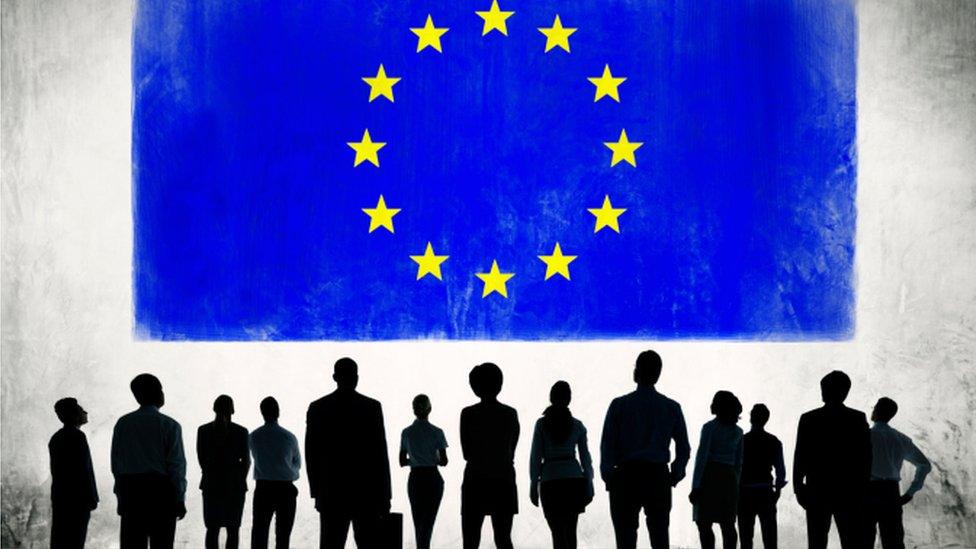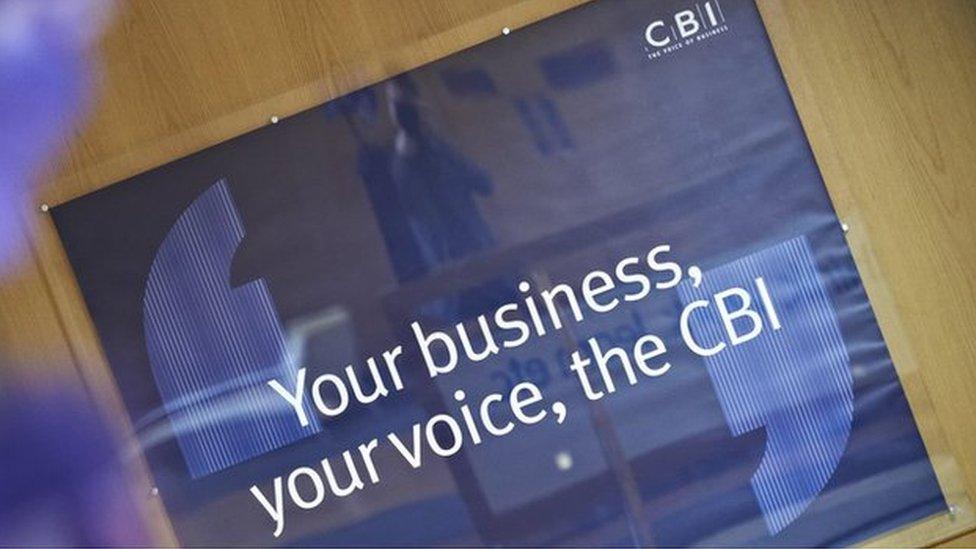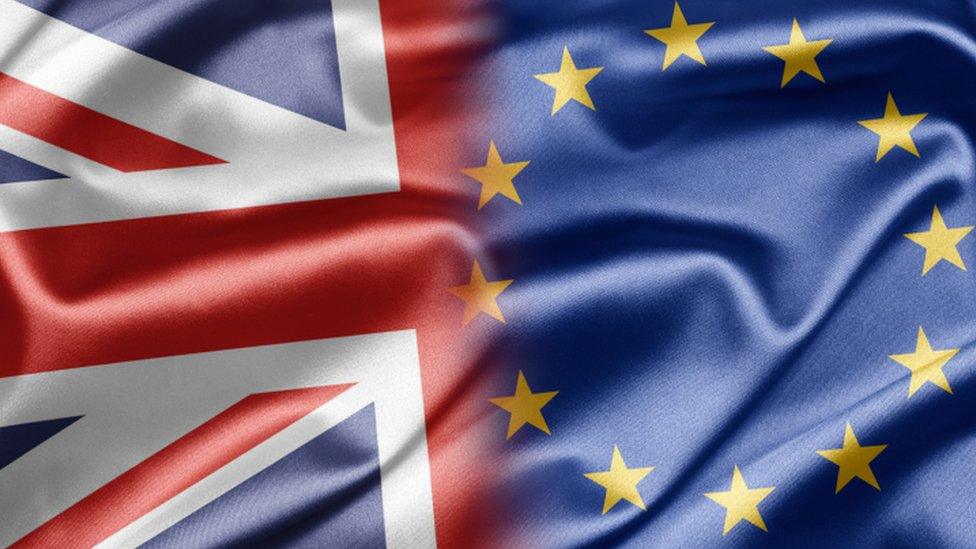How business votes: from indyref to Brexit
- Published

No, I know - businesses don't get votes in a referendum. People do. But they can't avoid involvement in the campaigns.
That's partly out of corporate self-interest. They don't like Westminster influence over Scotland/Brussels red tape, or they see opportunities from shaking things up. Alternatively, they abhor upheaval, uncertainty, new barriers and new sets of regulations.
It's also partly because they can get dragged in anyway, even while trying to remain neutral. Their votes may not count, but their voices do, and they are sought out.
A new study of the Scottish independence referendum campaign observes that it's the bit companies don't say that can cause them problems.
Saying nothing can be seen as indifference - as if not affected by the outcome. Or it can be interpreted, liberally, as tacit approval for one side, the other, or both.
Campaign mischief-making and distortions can make a mockery of neutrality. Prince William probably now knows how they felt.
Ineptly entangled
A popular way your corporate voice can be heard is anonymously, in a survey - best of all, those carried out by trade bodies. You're paying them sub fees to lobby, to mix with politicians, to get your sector's message across. So surely they can take the flak?
Like CBI Scotland did? Hmm, maybe not. It became ineptly entangled in referendum rules, its authority in speaking for business faced ferocious challenge, and public sector members responded to public pressure to quit.

Well, we now have a new business survey, published by Scottish Chambers of Commerce. It shows a very large business lead for "remain" in the EU, but a narrowing of the gap since last time the membership was asked, in September.
Some 68% of those responding to the survey are for staying in, while 20% prefer to leave. The "remain" lead is down from 60 percentage points to 48.
Moving HQ
In the world of real voters, mainstream polls show a very much closer-fought campaign. And that should be one big change from the independence referendum.
The comfortable and stable lead for "No" until late into the 2014 campaign allowed pro-union business leaders to stand back. Most avoided controversy and commitment - until polls narrowed and a "Yes" became much less unlikely.
Investors and clients started demanding to know if firms had contingency plans in place. Some chief executives responded, with much publicity: yes, they did have plans, including a restructure or move of their registered head offices out of Scotland.
There's now help to prepare for that kind of pressure. Brad MacKay and Owen Kelly have authored, external some important reflections and advice for business, as the Brexit vote hurtles towards them.
Brad MacKay is a Canadian at Edinburgh University Business School, where he amassed data and views from in-depth interviews with Scottish business leaders during the indyref campaign.
Owen Kelly bears the scars of having been a prominent voice of sceptical questioning about the Scottish government's independence plans on behalf of the financial sector.
That was when he was chief executive of Scottish Financial Enterprise. Stepping down last year, he's taken to the academic life, as student, researcher and teacher at Edinburgh and Edinburgh Napier universities.
Their study offers some fascinating nuggets of information and observation about the independence referendum.
Of 75 in-depth interviewees, more than a tenth said they deferred investment decisions because of the uncertainties surrounding Scottish independence.
One in eight made preparations to restructure and move their registrations out of Scotland - led by the finance sector.
Many were much stronger views than those expressed by trade bodies that were sent out to represent them.
And some ran into trouble when their leading figures took a stand. "There are reputational risks for any company with an outspoken leader, however firmly it is asserted that views are personal," write MacKay and Kelly.

So what advice have they filtered and distilled for corporate combatants in the Brexit campaign?
* Above all, prepare yourself and don't be so sure you can remain uninvolved.
* Weigh up your company's impacts and risks from potential change. This should be at least for internal discussion, but may also be to engage with investors, markets and employees.
* Plan for different scenarios. That should help identify the uncertainties that matter. You could bring in academics as neutral commentators to examine the issues.
Weir Group did that in 2014, commissioning a study from Oxford Economics. (It didn't say much new, but it said it with an authority and detachment that the Glasgow engineering firm itself did not have.)
* Who decides the company line? And how is it communicated - through trade bodies, or through the annual report, in which "forward-looking risks" may legally have to be stated? These were a rich seam of news reports earlier in 2014.
The big banks are likely to have more for us later this month, on the prospects for the UK leaving the EU.
Sounding the alarm
* It may be possible to keep major investors reassured - if you start early enough, and don't panic late on.
* But what are you going to tell your employees (who might just make your message public) about the risks to their jobs from changes to market access from independence/Brexit?
This was "hotly debated" within several executive teams in Scotland's indyref, report MacKay and Kelly. A significant number "decided not to communicate the implications of the independence debate for their Scottish employees".
So here's a big question: do employees not have an entitlement to be told?
Business supporters of independence sought to reassure employees and the wider public that they should not be worried, and that opportunity knocked for small countries like Scotland.
But Babcock was one big employer that chose to sound the alarm, to civilian workers on UK Ministry of Defence contracts.
The founding chairman of Barrhead Travel wrote to his employees in blunt terms about the risks he perceived in Scottish independence. You may recall his letter, once in the media and social media, created something of a storm.
Data versus emotion
* That relates to an important challenge to corporate thinking. Most executives try to make decisions based on data and evidence.
They may think that will be what matters in a political debate on Scottish independence, or on European Union membership. If so, they should think again.
"This is at odds with 'normal' commercial decision-making, where data is of primary importance," say MacKay and Kelly. "Emotion plays a much greater role."
'50-50'?
And here's another thing, of particular relevance to those of us reporting on the referendum.
Broadcasters are obliged to provide due impartiality, and the BBC's guidelines require a "broad balance" of views.
What that meant in practice in 2014 was that two sides of every facet of debate should have been given equal airtime. A lot of effort went into ensuring that they were.
So while "politically neutral research" showed business figures were much more weighted to the risks than the opportunities from Scottish independence, this isn't how it looked:
"Media coverage presented it frequently as being '50-50', when the reality was closer to '90-10', say MacKay and Kelly. "The media can thus have a well-intentioned distorting influence on public perception."
Well, at least they think we were well-intentioned. Not everyone has been that charitable.